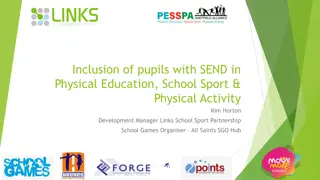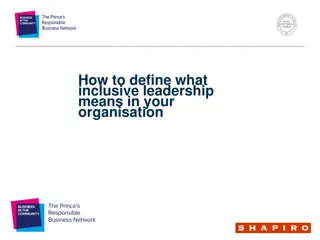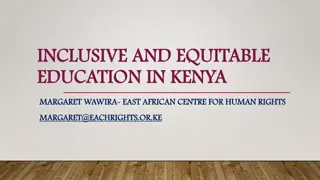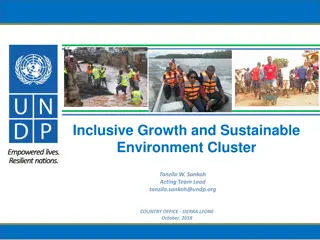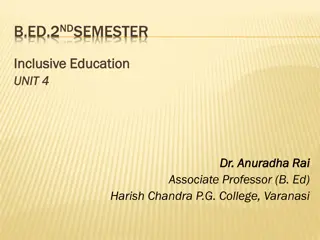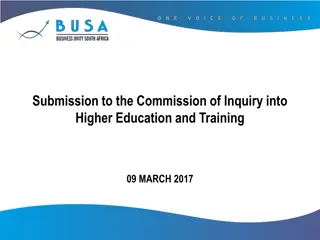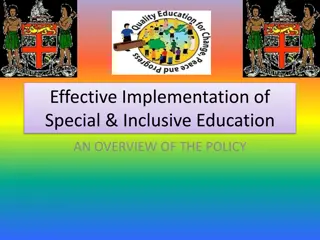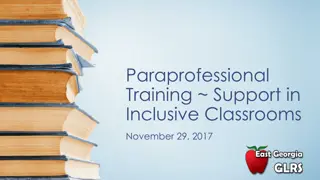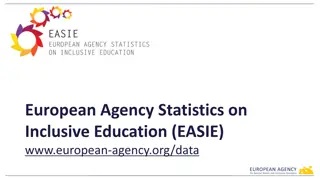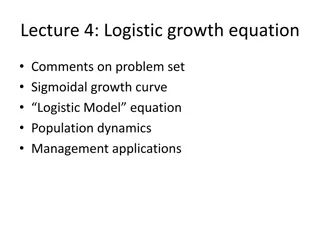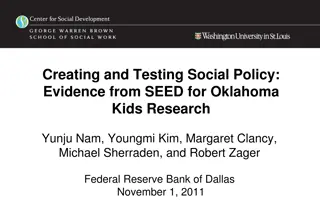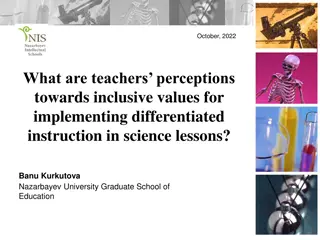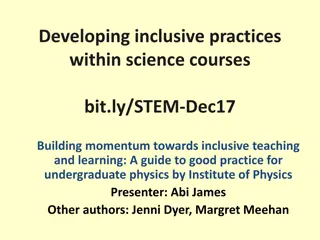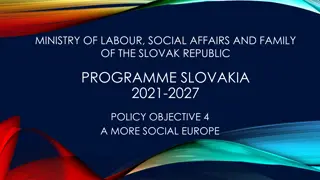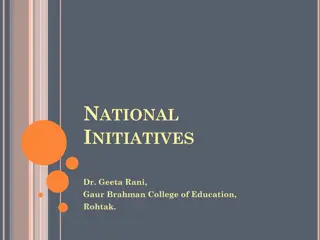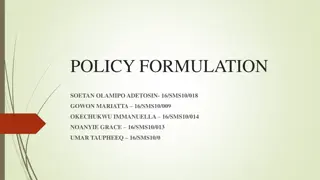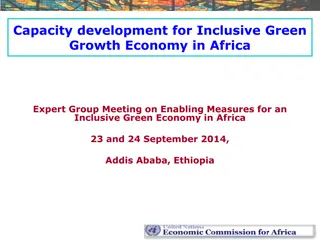Education Policy for Inclusive Growth: Challenges and Opportunities
Explore the significance of education policy in fostering inclusive growth, assess the current state of education systems, and identify strategies to leverage crises for reforms. Discover the importance of foundational skills for economic development and the need for targeted interventions. Dive into the educational landscape of Uganda, Senegal, Vietnam, and more to ascertain areas for improvement and innovation.
Download Presentation

Please find below an Image/Link to download the presentation.
The content on the website is provided AS IS for your information and personal use only. It may not be sold, licensed, or shared on other websites without obtaining consent from the author. Download presentation by click this link. If you encounter any issues during the download, it is possible that the publisher has removed the file from their server.
E N D
Presentation Transcript
Education Policy and Inclusive Growth James Habyarimana Georgetown University January 13, 2022
Outline Why Education Policy Matters for Inclusive Growth? Is our Education System primed to deliver? How can we leverage the current education crisis to reform for inclusive growth? Complete education reforms Promising interventions for today, short and medium run Ability based instruction Structured pedagogy programs Pre-school programs
Why education policy matters Demographic Opportunity? Uganda has one of the youngest populations Yet to begin a demographic transition Education reforms don t go far enough UPE, USE, USE+ Thematic curriculum STEM-promotion Mastery of foundational skills critical for economic growth policies Industrial Policy Industrial parks Export Diversity & Complexity Guest worker programs
Foundational skills build 21st century skills! Job-related Skills Foundational Cognitive Skills Socio- emotional Skills
Our Education System today 1 .8 Expected Years in School And Learning-Adjusted Years of Schooling 16.0 13.6 14.0 13.0 12.3 12.2 12.2 11.6 12.0 10.7 10.2 10.0 9.4 9.2 9.1 8.3 7.8 7.8 8.0 7.2 7.0 5.7 5.4 6.0 5.2 4.8 4.8 4.4 4.0 2.0 0.0 Uganda Senegal Tanzania Zambia Malawi Kenya Ghana Malaysia Vietnam Sri Lanka Korea, Rep. Expected Years of School Learning-Adjusted Years of School Source: World Bank Human Capital Index
Underperforms relative to aspirational peers! 16.0 Years of School vs Competencies 13.6 14.0 12.3 12.2 12.0 10.7 10.2 10.0 7.8 8.0 7.0 6.0 4.4 4.0 2.0 0.0 Uganda Kenya Vietnam Korea, Rep. Expected Years of School Learning-Adjusted Years of School
The covid-19 disruption is an opportunity to deepen reforms Further curriculum reforms.. Thematic curriculum reform was only a first step Less ambitious curriculum, at least early in the primary cycle Focus on foundational skills learning Re-orient the system Specify foundational skills learning goals Support teachers to meet these goals Invest in early childhood education School readiness
A focus on helping teachers deliver learning in large classes! Teacher Attribute Absence from classroom (%) Absence from school (%) Uganda (2013) Kenya (2012) 52.5 23.8 42.2 15.5 Scheduled teaching day (minutes) Time spent teaching (minutes) Student-teacher ratio, grade 4 439.0 196.7 44.7 341.5 160.5 32.1 Average score on language and math sections (%) Teachers who pass at the 100% threshold (%) Teachers who pass at the 90% threshold (%) Teachers who pass at the 80% threshold (%) 63.2 1.8 5.2 19.5 74.1 5.6 13.6 39.4 Source: World Bank Service Delivery Indicators
Today: Ability Based Instruction
Short run: Structured Pedagogical Programs: Evidence from Kenya Ongoing Monitoring and Support Structured teaching guides and student materials Effective continuous professional development Specific learning goals Source: Piper, Zuilkowski et al (2018)
Medium run: Early childhood programs for school readiness Lively Minds, Ghana BRAC Uganda The Challenge Early childhood years represent a crucial window for development, as it is during these early years that children form the basis for future learning. There is growing evidence that investments in early childhood have high returns, and that missed opportunities to promote early children s educational attainment and future well-being. In 2007, the Government of Ghana added two years of pre-primary kindergarten education to be included in the country s universal basic education. However, many rural schools struggle with a lack of trained teachers, large class sizes, lack of play-based resources, teacher absenteeism, and an emphasis on rote-based teaching. Additionally, low levels of maternal education may reduce rural parents involvement in their children s education. Maternal education levels are particularly low in the areas where this study took place: As of 2014, the median educational attainment for women was 0 years in the Northern region and 2.9 years in the Upper East region, compared to a national average of 7.2 years.1 Equipping teachers and mothers with skills and training has the potential to improve the quality of early childhood education, leading to large-scale improvements in child learning and development. The Program The NGO Lively Minds works with the Ghana Education Service (GES) at the district level to train and empower uneducated mothers to run educational play-based activities for all the preschoolers in their community and to provide better care at home. The Lively Minds program, a hybrid model that simultaneously targets home and preschool environments through parents, includes the following components: Four days a week for one hour, groups of trained mothers come to the kindergarten during school hours to facilitate the play schemes. The children are also divided into groups, and each group participates in the play scheme once a week for one hour. The remaining children play outdoor games facilitated by some of the trained mothers. The mothers each run a play station and teach using discovery- based methods, rather than the rote-based teaching that is common in Ghana s kindergarten classrooms. Children have to wash their hands with soap before participating, with the goal of developing handwashing habits. Children are divided into small groups and rotate A series of engagement and sensitization activities are held for Ghana Education Service (GES) district teams to increase their awareness of early childhood development and to gain their buy-in and ownership of the program. District teams are given an ongoing package of capacity-building support to enable them to deliver the program activities described below. Kindergarten teachers deliver scripted monthly group parenting workshops for the mothers, where they teach simple ways to improve parenting using locally available materials. Topics covered in the workshops include nutrition, hygiene, child rights, play, communication, malaria Two kindergarten teachers from each school receive a education and play, play scheme management, how to use and make games, and how to train mothers. The head teacher and parent teacher association chair attend part of education. supported by the GES district teams. monitoring visits to each play scheme once a month as part The trained kindergarten teachers then train 30-40 mothers on how to facilitate the play schemes in their community during two two-hour community meetings and eight two- hour participatory workshops. The training is scripted and designed for women who are illiterate and have never been to school. Content includes the importance of education and play, how to make and play games, child-friendly teaching, and how to install simple handwashing devices (tippy-taps) at home. This training is supervised by GES district teams. conduct surprise monitoring visits, and they hold monthly meetings in partnership with GES district teams to track the progress of the play schemes and ensure implementation workshops for the kindergarten teachers to refresh their knowledge of the play schemes and to train them to deliver the parenting workshops. Innovations for Poverty Action | 2



